| Listing 1 - 9 of 9 |
Sort by
|
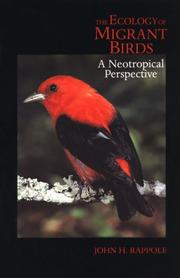
ISBN: 1560985135 Year: 1995 Publisher: Washington London Smithsonian Institution Press
Abstract | Keywords | Export | Availability | Bookmark
 Loading...
Loading...Choose an application
- Reference Manager
- EndNote
- RefWorks (Direct export to RefWorks)
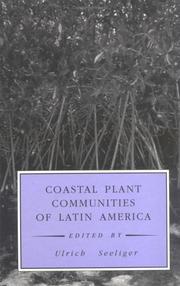
ISBN: 0126345503 0080925677 9780126345506 Year: 1992 Publisher: San Diego: Academic press,
Abstract | Keywords | Export | Availability | Bookmark
 Loading...
Loading...Choose an application
- Reference Manager
- EndNote
- RefWorks (Direct export to RefWorks)
Coastal plants --- Plant communities --- Ecology --- Latin America --- coastal flora --- dunes --- ecology --- macroalgae --- mangroves --- plant communities --- salt marshes --- seagrasses --- Coastal plants - Ecology - Latin America --- Plant communities - Latin America
Book
Year: 2012 Publisher: New York : Columbia University Press,
Abstract | Keywords | Export | Availability | Bookmark
 Loading...
Loading...Choose an application
- Reference Manager
- EndNote
- RefWorks (Direct export to RefWorks)
This book addresses two important and related questions: does participation in a market economy help or hurt indigenous peoples and how does it affect the conservation of tropical rainforest flora and fauna? Oddly, there have been few quantitative studies that have addressed these issues.Ricardo Godoy's research takes an important step toward rectifying this oversight by investigating five different lowland Amerindian societies of tropical Latin America?all of which are experiencing deep changes as they modernize. Godoy examines the effect of markets on a broad range of areas incl
Deforestation -- Economic aspects -- Latin America. --- Human ecology -- Government policy -- Latin America. --- Indians of Central America -- Social conditions. --- Indians of South America -- Social conditions. --- Latin America -- Economic conditions. --- Latin America -- Social conditions. --- Rain forest ecology -- Latin America. --- Rain forests -- Economic aspects -- Latin America. --- Social change -- Latin America.
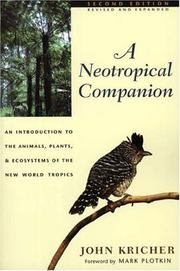
ISBN: 0691044333 Year: 1997 Publisher: Princeton, N.J. Princeton University Press
Abstract | Keywords | Export | Availability | Bookmark
 Loading...
Loading...Choose an application
- Reference Manager
- EndNote
- RefWorks (Direct export to RefWorks)
Zone tropicale --- Tropical zones --- Faune --- Fauna --- Flore --- Flora --- Biotope --- biotopes --- Écosystème --- ecosystems --- Forêt tropicale humide --- Tropical rain forests --- Côtes --- Coasts --- Mangrove swamps --- Corail --- Corals --- Déboisement --- Deforestation --- Biodiversité --- Biodiversity --- Amérique centrale --- Central America --- Ecology --- -Natural history --- -History, Natural --- Natural science --- Physiophilosophy --- Biology --- Science --- Balance of nature --- Bionomics --- Ecological processes --- Ecological science --- Ecological sciences --- Environment --- Environmental biology --- Oecology --- Environmental sciences --- Population biology --- -Ecology --- Natural history --- Latin America --- Ecology - Latin America. --- Natural history - Latin America.
Book
ISBN: 0520096738 9780520096738 Year: 1991 Volume: 124 Publisher: Berkeley (Calif.): University of California press,
Abstract | Keywords | Export | Availability | Bookmark
 Loading...
Loading...Choose an application
- Reference Manager
- EndNote
- RefWorks (Direct export to RefWorks)
Kingfishers --- Bird populations --- 597.554.1 --- -Kingfishers --- -Alcedinidae --- Coraciiformes --- Characinidae. Piranha --- -Feeding and feeds --- -Bird populations --- -Characinidae. Piranha --- -597.554.1 --- 597.554.1 Characinidae. Piranha --- -591.55 Communal life. Animal societies --- Alcedinidae --- Ecology --- Feeding and feeds --- 591.55 --- 591.55 Communal life. Animal societies --- Communal life. Animal societies --- Vertebrate populations --- Latin America --- South America --- North America --- Kingfishers - Ecology - Latin America. --- Kingfishers - Ecology - South America. --- Kingfishers - Feeding and feeds - Latin America. --- Kingfishers - Feeding and feeds - South America. --- Kingfishers - Ecology - North America. --- Kingfishers - Feeding and feeds - North America. --- Bird populations - Latin America.
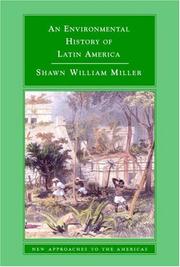
ISBN: 9780521612982 0521612985 9780521848534 0521848539 9780511800672 1316223825 1316223426 0511800673 Year: 2007 Publisher: Cambridge Cambridge University Press
Abstract | Keywords | Export | Availability | Bookmark
 Loading...
Loading...Choose an application
- Reference Manager
- EndNote
- RefWorks (Direct export to RefWorks)
A narration of the mutually mortal historical contest between humans and nature in Latin America. Covering a period that begins with Amerindian civilizations and concludes in the region's present urban agglomerations, the work offers an original synthesis of the current scholarship on Latin America's environmental history and argues that tropical nature played a central role in shaping the region's historical development. Human attitudes, populations, and appetites, from Aztec cannibalism to more contemporary forms of conspicuous consumption, figure prominently in the story. However, characters such as hookworms, whales, hurricanes, bananas, dirt, butterflies, guano, and fungi make more than cameo appearances. Recent scholarship has overturned many of our egocentric assumptions about humanity's role in history. Seeing Latin America's environmental past from the perspective of many centuries illustrates that human civilizations, ancient and modern, have been simultaneously more powerful and more vulnerable than previously thought.
Human ecology --- Nature --- Rain forest ecology --- Rain forest conservation --- Forest management --- Environmental degradation --- History --- Effect of human beings on --- Latin America --- Environmental conditions --- History of Latin America --- anno 1200-1799 --- anno 1800-1999 --- Human ecology - Latin America - History --- Nature - Effect of human beings on - Latin America - History --- Rain forest ecology - Latin America - History --- Rain forest conservation - Latin America - History --- Forest management - Latin America - History --- Environmental degradation - Latin America - History --- Latin America - Environmental conditions - History --- History. --- Ecology --- Environment, Human --- Human beings --- Human environment --- Ecological engineering --- Human geography --- Forest conservation --- Equatorial forest ecology --- Rain forests --- Tropical rain forest ecology --- Forest ecology --- Forest administration --- Forest plants --- Forest resource administration --- Forest resource management --- Forest stewardship --- Forest vegetation management --- Forestry management --- Forests and forestry --- Stewardship, Forest --- Vegetation management, Forest --- Ecosystem management --- Natural resources --- Degradation, Environmental --- Destruction, Environmental --- Deterioration, Environmental --- Environmental destruction --- Environmental deterioration --- Natural disasters --- Environmental quality --- Social aspects --- Effect of environment on --- Management --- Administration --- Control --- Asociación Latinoamericana de Libre Comercio countries --- Neotropical region --- Neotropics --- New World tropics --- Spanish America
Book
ISBN: 9780821382370 0821382373 9780821383810 0821383817 128272553X 9786612725531 Year: 2010 Publisher: Washington, D.C. : World Bank,
Abstract | Keywords | Export | Availability | Bookmark
 Loading...
Loading...Choose an application
- Reference Manager
- EndNote
- RefWorks (Direct export to RefWorks)
This book addresses the social implications of climate change and climatic variability on indigenous peoples and communities living in the highlands, lowlands, and coastal areas of Latin America and the Caribbean. Across the region, indigenous people already perceive and experience negative effects of climate change and variability. Many indigenous communities find it difficult to adapt in a culturally sustainable manner. In fact, indigenous peoples often blame themselves for the changes they observe in nature, despite their limited emission of green house gasses. Not only is the viability of
Indigenous peoples --- Human beings --- Climatic changes --- Autochtones --- Homme --- Climat --- Ecology --- Effect of climate on --- Ecologie --- Influence du climat --- Changements --- Latin America --- Caribbean Area --- Amérique latine --- Caraïbes (Région) --- Environmental conditions --- Environnement --- Caribbean Area -- Environmental conditions. --- Climatic changes -- Caribbean Area. --- Climatic changes -- Latin America. --- Human beings -- Effect of climate on -- Caribbean Area. --- Human beings -- Effect of climate on -- Latin America. --- Indigenous peoples -- Ecology -- Caribbean Area. --- Indigenous peoples -- Ecology -- Latin America. --- Latin America -- Environmental conditions. --- Anthropogeography & Human Ecology --- Anthropology --- Social Sciences --- Climatic factors --- Environmental conditions. --- Amérique latine --- Caraïbes (Région) --- Homo sapiens --- Human race --- Humanity (Human beings) --- Humankind --- Humans --- Man --- Mankind --- People --- Changes, Climatic --- Climate change --- Climate changes --- Climate variations --- Climatic change --- Climatic fluctuations --- Climatic variations --- Global climate changes --- Global climatic changes --- Aboriginal peoples --- Aborigines --- Indigenous populations --- Native peoples --- Native races --- Environmental aspects --- Caribbean Free Trade Association countries --- Caribbean Region --- Caribbean Sea Region --- West Indies Region --- Asociación Latinoamericana de Libre Comercio countries --- Neotropical region --- Neotropics --- New World tropics --- Spanish America --- Hominids --- Persons --- Climatology --- Climate change mitigation --- Teleconnections (Climatology) --- Ethnology --- Adivasis --- Changes in climate --- Climate change science --- Ethnoecology --- Human ecology --- Traditional ecological knowledge --- Global environmental change

ISBN: 0195109961 9786610529186 0195355067 1280529180 1429404388 9780195109962 0197702279 Year: 1998 Publisher: New York (N.Y.): Oxford university press,
Abstract | Keywords | Export | Availability | Bookmark
 Loading...
Loading...Choose an application
- Reference Manager
- EndNote
- RefWorks (Direct export to RefWorks)
It has proved hard to establish national parks in Africa, Asia, and South and Central America, where inhabitants are resistant to change. This text explores the alternatives of integrated conservation and development projects & related initiatives.
Rain forest conservation --- Deforestation --- Forest ecology --- Non-timber forest resources --- Sustainable forestry --- Habitat conservation --- Ecotourism --- Control --- Environmental Sciences and Forestry. Forestry --- Forest Economics --- CON Bioconservation --- Latin America --- bioconservation --- conservation --- forest conservation --- nature conservation --- tropical forests --- Forest Economics. --- E-books --- Non-timber forest products --- Eco-tourism --- Eco-travel --- Ecological tourism --- Ecotravel --- Environmental tourism --- Green tourism --- Nature tourism --- Tourism --- Conservation of habitat --- Habitat preservation --- Habitat protection --- Habitat (Ecology) --- Preservation of habitat --- Protection of habitat --- Nature conservation --- Forest productivity, Maintenance of long-term --- Long-term forest productivity, Maintenance of --- Maintenance of long-term forest productivity --- Forests and forestry --- Sustainable agriculture --- Forest resources, Non-timber --- Non-wood forest products --- Nontimber forest products --- Nontimber forest resources --- Forest products --- Ecology --- Conversion, Forest --- Depletion of forests --- Disforestation --- Forest conversion --- Forest depletion --- Forest-land conversion --- Clearing of land --- Forest fires --- Plants --- Forest conservation --- Conservation --- Protection --- Extinction --- Forest ecosystems --- Rain forest conservation - Latin America. --- Deforestation - Control - Latin America. --- Forest ecology - Latin America. --- Non-timber forest resources - Latin America. --- Sustainable forestry - Latin America. --- Habitat conservation - Latin America. --- Ecotourism - Latin America.
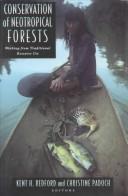
ISBN: 0231076029 Year: 1992 Volume: vol *2 Publisher: New York Columbia University Press
Abstract | Keywords | Export | Availability | Bookmark
 Loading...
Loading...Choose an application
- Reference Manager
- EndNote
- RefWorks (Direct export to RefWorks)
Nature --- Indians of South America --- Indians of Central America --- Rain forest ecology --- Rain forest conservation --- Forest management --- Traditional farming --- Homme --- Indiens d'Amérique --- Ecologie des forêts pluviales --- Forêts pluviales --- Forêts --- Agriculture traditionnelle --- Effect of human beings on --- Economic conditions --- Influence sur la nature --- Conditions économiques --- Conservation --- Gestion --- 630*913 --- 630*9 <8=6> --- -Indians of Central America --- -Indians of South America --- -Rain forest conservation --- -Rain forest ecology --- -Traditional farming --- -Nature --- -Agriculture, Primitive --- Farming, Traditional --- Primitive agriculture --- Traditional agriculture --- Agriculture --- Equatorial forest ecology --- Rain forests --- Tropical rain forest ecology --- Forest ecology --- Forest conservation --- American aborigines --- American Indians --- Indigenous peoples --- Meso-America --- Meso-American Indians --- Mesoamerica --- Mesoamerican Indians --- Pre-Columbian Indians --- Precolumbian Indians --- Ethnology --- Forest administration --- Forest plants --- Forest resource administration --- Forest resource management --- Forest stewardship --- Forest vegetation management --- Forestry management --- Forests and forestry --- Stewardship, Forest --- Vegetation management, Forest --- Ecosystem management --- Natural resources --- Relations between forest, agricultural and pastoral land. Clearing of forest; afforestation of agricultural and pastoral land; shifting cultivation (policy) --- Forests and forestry from the national point of view. Forestry policy. Afforestation policy. Social economics of forestry--Latijns Amerika --- Congresses --- -Congresses --- Ecology --- Management --- Administration --- Control --- -Relations between forest, agricultural and pastoral land. Clearing of forest; afforestation of agricultural and pastoral land; shifting cultivation (policy) --- 630*9 <8=6> Forests and forestry from the national point of view. Forestry policy. Afforestation policy. Social economics of forestry--Latijns Amerika --- 630*913 Relations between forest, agricultural and pastoral land. Clearing of forest; afforestation of agricultural and pastoral land; shifting cultivation (policy) --- -630*913 Relations between forest, agricultural and pastoral land. Clearing of forest; afforestation of agricultural and pastoral land; shifting cultivation (policy) --- Agriculture, Primitive --- Indiens d'Amérique --- Ecologie des forêts pluviales --- Forêts pluviales --- Forêts --- Conditions économiques --- Effect of human beings on&delete& --- Human beings --- Influence on nature --- Latin America --- Man - Influence on nature - Latin America - Congresses. --- Indians of South America - Economic conditions - Congresses. --- Indians of Central America - Economic conditions - Congresses. --- Rain forest ecology - Latin America - Congresses. --- Rain forest conservation - Latin America - Congresses. --- Forest management - Latin America - Congresses. --- Traditional farming - Latin America - Congresses.
| Listing 1 - 9 of 9 |
Sort by
|

 Search
Search Feedback
Feedback About UniCat
About UniCat  Help
Help News
News